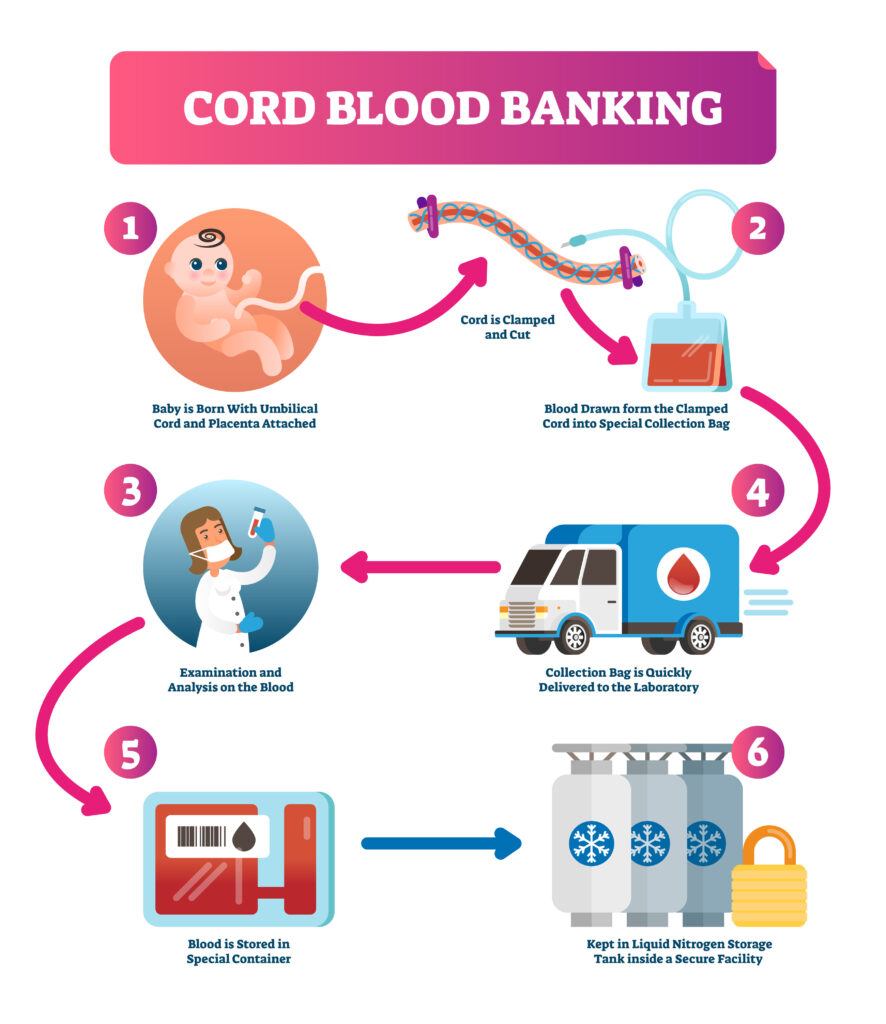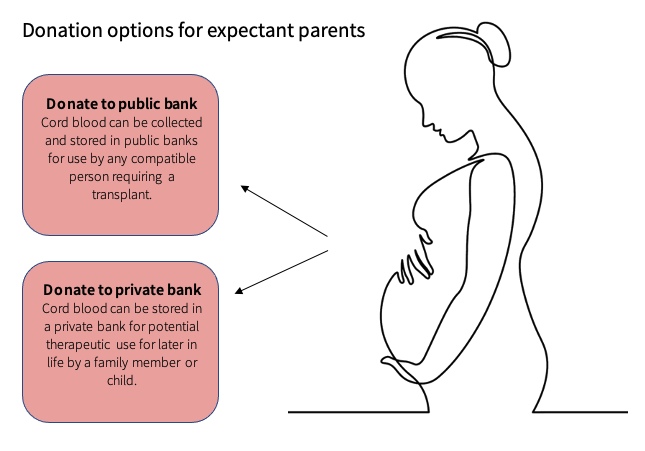Giving life, twice:
Knowledge and understanding
of donating cord blood
By the Donor Research Network
We all know that donating blood saves lives. But did you know that the blood in the umbilical cord and placenta after a baby is born also has amazing lifesaving qualities? Indeed, this blood, previously thrown away after birth, is rich in blood stem cells that can be used to help treat over 80 different types of diseases, such as leukemia, lymphoma, and other inherited immune disorders (1). When donated to someone in need, these stem cells develop into new bone marrow and produce healthy blood cells – giving the gift of life not only to a newborn baby, but to someone with a blood and/or immune disease.
How is cord blood collected?

What options are available for cord blood banking?
In most countries, expectant parents have two options when it comes to donating cord blood (3): (1) Parents may choose to donate the cord blood to a public cord blood bank at no financial cost. If this option is selected, the public bank will collect, transport, process, test, and store the sample to be used altruistically for any person who is compatible and in need. There are currently more than 803,983 frozen units of cord blood stored in over 134 public banks across 55 countries, and more than 35,000 patients around the world have received cord blood transplants via a public cord bank (4). Alternatively, (2) Parents may pay a fee for a private cord blood bank to collect, process and store the blood for later use by the parents, family member or child. There are an estimated 220 private cord blood banks globally, storing over 5 million samples (5).

Knowledge and Understanding of Cord Blood Donation and Banking Options
Research has shown that parent’s knowledge and understanding of cord blood donation and banking is low. In fact, a study by Velikonja and colleagues (2021) showed that only a quarter of people were aware of cord blood banking, and only a few people were able to identify at least one cord blood bank. Most people in the study also self-reported that they knew little about cord blood banking, and there was minimal difference found between professionals’ and non-professionals’ knowledge of cord blood donation. In their review, Peberdy and colleagues also found that parent’s knowledge of cord blood banking and/or donation was low. However, knowledge was higher where people had been provided with information on cord blood banking and/or donation by their antenatal health care provider or in antenatal classes (6). This finding highlights the importance of providing parents with information on cord blood donation and banking in routine antenatal care.

Awareness and understanding of cord blood donation and banking is critical as it not only enables parents to make an informed choice about cord blood storage, it also ensures the supply of these potentially life-saving cells. Every year thousands of people are diagnosed with a blood and/or immune disease that can be potentially treated with a haematopoietic or blood stem cell transplant (7). However, the chances of these patients finding a suitable match ranges from 29% to 79% depending on their ethnic background (8).
Finding the right match is hard. Fortunately, cord blood donations from babies of different ethnic backgrounds can help. Cord blood donation is quick, safe and painless for parents’ and babies, and provides lifesaving stem cells that can help in the treatment of leukemia, lymphoma, sickle cell anaemia and other life-threatening diseases. By donating umbilical cord blood, you give these patients and their families hope.
How can I help?
- Read about cord blood donation and banking within your country. You can see if your country has a public cord blood bank here. Alternatively, you can view private cord blood banks in your country here.
- Spread the word! Talk to your friends, family, co-workers and followers on social media about cord blood donation, and banking to increase awareness of this important cause.
- If you are not able to donate cord blood, read about other donations that you may be eligible for in your country such as blood, plasma, breast milk, microbiota (stool) and organ donation.
Interested in learning more?
- Listen to Dr. Jennie Haw’s 2021 DoRN Week of Talks presentation, which discusses the background on umbilical blood cord donations and the national cord bank in Canada.
- Read our blog ‘Engaging Perinatal Donors,’ which discusses the importance of human breast milk and umbilical cord blood donations during the perinatal period of life.
- Watch this short educational video on cord blood donation by the Canadian Blood Services.
- Read about the Australian perspective on the importance of cord blood banking in the Covid-19 pandemic.
- Learn more from leading organisations around the world about cord blood donation and voluntary banking:

About the author
Courtney is a Science Communication Officer for the Donor Research Network (DoRN) and a Research Assistant for the “Helping the Medical Matchmakers: Sustaining and Understanding Living Donors” program.
In addition to this, Courtney is currently completing the Master of Clinical Psychology program at the University of Queensland.